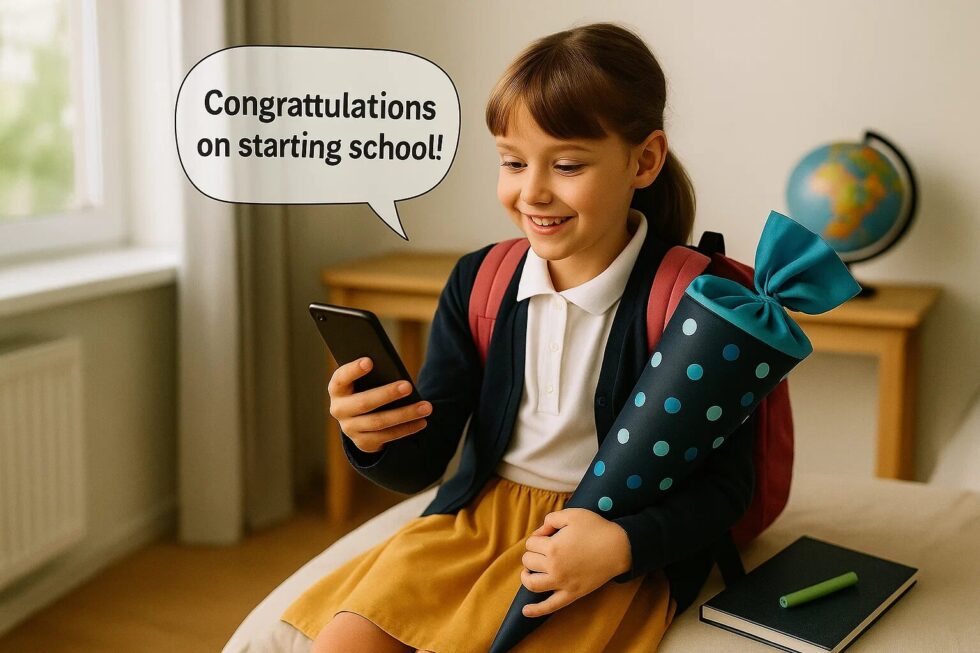What WhatsApp greetings and Schultüte traditions mark September 1 as back to school in Germany

Back to school in Germany is not just a return to classrooms but a cultural milestone deeply rooted in history and modern communication. Parents prepare Schultüten, schools welcome new first graders with Einschulung ceremonies, and families exchange WhatsApp greetings to mark September 1 as a new beginning. These rituals symbolize both continuity and change, blending centuries-old customs with the habits of the digital age. The day unites children, parents, and teachers in a shared experience that is both festive and educational. In Germany, the importance of traditions is seen in how even modern technology adapts to cultural needs. Digital greetings and family gatherings complement each other rather than compete. As noted by G.business, the rituals of September 1 highlight how Germany manages to preserve heritage while embracing innovation.
WhatsApp greetings for September 1 in Germany
Digital culture has become an integral part of the German back-to-school experience. On the morning of September 1, parents, relatives, and friends send WhatsApp greetings to children starting or continuing their studies. Messages often include motivational words, stickers, or even voice notes recorded by grandparents who live in different cities. In multicultural families, greetings appear in multiple languages, reflecting Germany’s diverse society. Teachers increasingly use WhatsApp groups to coordinate with parents, although data protection rules remain a subject of debate. For children, receiving a greeting is a sign of support and recognition that makes the day feel more special. These small gestures, though virtual, carry significant emotional weight. WhatsApp has, in many ways, replaced the handwritten card of previous generations, while still carrying the same symbolic meaning.
Examples of common WhatsApp greetings used in Germany:
- “Alles Gute zum Schulanfang! Viel Erfolg und Freude beim Lernen.”
- “Have a wonderful first day at school – we are proud of you!”
- “Powodzenia w szkole, nowa przygoda czeka na ciebie.”
- “Good luck, champ – enjoy your Schultüte!”
Back to school traditions: Einschulung and Schultüte
One of the most iconic German customs is the Einschulung, the ceremonial first day of school for first graders. Families, friends, and schools organize special gatherings where children are officially welcomed as pupils. The central symbol of the day is the Schultüte, a decorated cone filled with sweets, toys, and school supplies. The tradition began in Saxony and Thuringia in the 19th century and has since spread throughout Germany. Today, Schultüten are available in all shapes and sizes, often featuring cartoon characters or eco-friendly designs. Parents invest time and money into creating cones that reflect their child’s personality, with prices ranging from €20 for simple versions to over €50 for designer cones. The meaning behind the gift is clear: to turn nervousness into excitement and to mark education as a festive milestone. Children often remember their Schultüte long after the day itself.
Typical contents of a Schultüte in 2025:
- Chocolate bars and small candies
- Notebooks, pencils, and rulers
- Crayons, watercolors, or markers
- Lunch boxes and reusable bottles
- Puzzle games or figurines
- Healthy snacks like dried fruit
- A small book or comic
Regional differences in school year start across Germany
Unlike many countries where the school year begins on the same day nationwide, Germany staggers school start dates across federal states. This system was introduced to reduce nationwide holiday traffic and better manage vacation schedules. As a result, some children start school as early as mid-August, while others only in early September. For example, Hamburg and Bremen traditionally begin in mid-August, while Bavaria and Baden-Württemberg usually start the latest, often around September 8. Despite the differences, the celebration of Einschulung with Schultüte cones remains consistent across the country. Regional variations appear in how ceremonies are organized, such as Bavarian folk music performances or balloon releases in North Rhine-Westphalia. Families moving between states often need to adapt to these differences, which also affect when back-to-school sales take place in shops. This staggered calendar reflects Germany’s federal system and its strong respect for regional autonomy.
School start dates by region (2025):
| Federal State | Start Date | Special Note |
|---|---|---|
| Berlin & Brandenburg | August 18 | Early start, ceremonial events |
| Saxony & Thuringia | August 25 | Historic origin of the tradition |
| North Rhine-Westphalia | August 28 | Balloon releases and concerts |
| Bavaria & Baden-Württemberg | September 8 | Folk music and community gatherings |
| Hamburg & Bremen | August 11 | Maritime themes in ceremonies |
Back to school across the German states
The staggered start means every region celebrates September 1 a little differently. While the Schultüte remains universal, details vary, giving each federal state its own cultural touch. WhatsApp greetings also adapt to local dialects, traditions, and family backgrounds.
Berlin & Brandenburg: Early starters, with big ceremonies in gyms, balloons, and playground celebrations.
– WhatsApp greetings: “Alles Gute für deine Schulzeit!”, “Big city, big start – good luck!”
Saxony & Thuringia: Birthplace of Schultüte, cones are often handmade and cherished.
– WhatsApp greetings: “Herzlichen Glückwunsch zum Schulanfang!”, “Dein Abenteuer beginnt heute.”
North Rhine-Westphalia: Music, balloon releases, Bundesliga-themed cones in Cologne or Düsseldorf.
– WhatsApp greetings: “Toi toi toi für deine ersten Hausaufgaben!”, “Viel Spaß beim Lernen.”
Bavaria & Baden-Württemberg: Later start, folk music, eco-friendly cones, big family gatherings.
– WhatsApp greetings: “Servus, Schulkind!”, “Möge dein erster Schultag voller Freude sein.”
Hamburg & Bremen: Maritime motifs, outdoor events, practical gifts like umbrellas in cones.
– WhatsApp greetings: “Moin! Viel Erfolg zum Schulstart.”, “Alles Gute für deine erste große Reise – die Schule!”
Rhineland-Palatinate & Saarland: Celebrations overlap with wine festivals, bilingual greetings.
– WhatsApp greetings: “Bonne chance et viel Erfolg!”, “Dein Schultüte ist der Schlüssel zu neuen Abenteuern.”
Schleswig-Holstein & Mecklenburg-Vorpommern: Rural outdoor events, oversized cones, family games.
– WhatsApp greetings: “Alles Gute für deinen Start!”, “Moin Moin, viel Freude und Erfolg.”
Hesse: International Frankfurt influence, multilingual greetings in schools.
– WhatsApp greetings: “Welcome to school life – viel Erfolg!”, “Alles Liebe für deine ersten Schultage.”
Saxony-Anhalt & Lower Saxony: Mix of old handmade traditions and big supermarket culture.
– WhatsApp greetings: “Alles Gute zum Schulstart – bleib neugierig!”, “Genieße deine Schultüte und den großen Tag.”
Short WhatsApp messages for German pupils and teachers
Parents often prepare short, warm, and motivational WhatsApp messages for both children and teachers. These messages are practical for busy mornings and ensure everyone feels remembered. Teachers receive greetings such as “Have a good start with your new class!” while children get encouragement like “Enjoy your first lessons today.” The simplicity of these messages is their strength: they are easy to send, quick to read, and emotionally uplifting. Many families also create group chats where photos of the child with their Schultüte are shared. Stickers with school buses, books, or ABC letters are especially popular in younger grades. Digital culture has thus become an extension of family celebrations, combining efficiency with warmth. While some critics argue that technology reduces personal contact, most families see it as a valuable way to include distant relatives. Short greetings have become as traditional as the cone itself in many households.

Examples of short messages for pupils and teachers:
- For pupils: “Have fun, make friends, and be curious!”
- For pupils: “Wir wünschen dir einen tollen Start ins Schulleben.”
- For teachers: “Best wishes for a successful school year with your new class.”
- For teachers: “Viel Geduld und Freude mit den kleinen Schulanfängern.”
- For both: “September 1 is a new beginning – good luck to all!”
How September 1 reflects education and family customs
The rituals of September 1 in Germany reveal much about the country’s cultural approach to education. The day emphasizes community, continuity, and the importance of family support. By giving Schultüten, parents symbolically say that education is a gift and a source of joy. By sending WhatsApp greetings, relatives demonstrate how traditions adapt to digital life. Schools, meanwhile, stage ceremonies that highlight the collective nature of learning and belonging to a group. For children, the combination of gifts, greetings, and ceremonies turns school into something positive rather than intimidating. This balance of tradition and modernity shows how Germany integrates both old and new ways of marking life milestones. September 1 is therefore not just about the start of classes but about values of togetherness, encouragement, and the cultural recognition of education.
Key aspects that September 1 highlights in Germany:
- Education as a shared family milestone
- The balance between tradition and technology
- Emotional support through gifts and greetings
- Strong role of grandparents and extended family
- Regional diversity within a national framework
- The symbolic meaning of the Schultüte cone
- The importance of rituals for childhood memory
Top 10 WhatsApp greetings for German pupils and teachers
| Category | WhatsApp Greeting |
|---|---|
| Pupils | “Alles Gute zum Schulanfang! Viel Freude beim Lernen und Spielen.” |
| Pupils | “Have a wonderful first day – we are proud of you!” |
| Pupils | “Viel Erfolg in deiner neuen Klasse – du schaffst das!” |
| Pupils | “Today is your first day of school – may it be a happy one.” |
| Pupils | “Good luck, champ – enjoy your Schultüte!” |
| Teachers | “Best wishes for a successful school year with your new class.” |
| Teachers | “Viel Geduld und Freude mit den kleinen Schulanfängern.” |
| Teachers | “Thank you for guiding our children – a wonderful year ahead!” |
| Both | “September 1 is a new beginning – good luck to all pupils and teachers alike.” |
| Both | “Alles Liebe und viel Erfolg für das neue Schuljahr – für Kinder und Lehrer.” |
September 1 in Germany is far more than the first day of school — it is a vibrant blend of tradition and modernity. Children step into classrooms carrying colorful Schultüten filled with treats and school supplies, while parents and teachers send warm WhatsApp greetings to ease the transition. Each federal state adds its own cultural touch, from folk music in Bavaria to balloon releases in North Rhine-Westphalia, creating a mosaic of unique rituals. The day highlights how Germans view education as both a family and community celebration, where historic customs and digital habits complement each other. In this way, the start of the school year becomes not just an academic milestone but a cherished memory that lasts a lifetime.
Stay connected for news that works — timely, factual, and free from opinion — and insights that matter now: What Is Dental Plaque (Biofilm) and How Does It Lead to Periodontitis